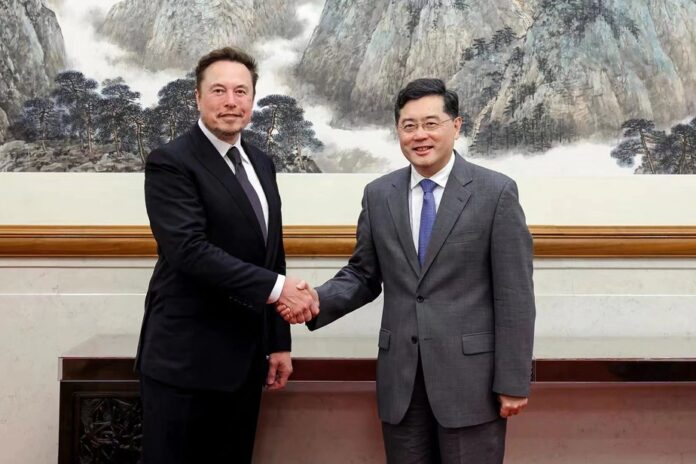(Beijing) From Elon Musk to Bill Gates to Tim Cook, the CEO of Apple, some of the biggest American bosses are making the trip to Beijing, seeming to ignore the China-United States trade war.
Already frequent before the pandemic, their visits were able to resume in December after the end of health restrictions linked to COVID-19, which had isolated China from the rest of the world for three years.
And they are an opportunity for them to demonstrate, in Beijing, their optimism about the vast Chinese market and the commercial links between the two largest economies in the world.
“The interests of the United States and China are closely linked, like inseparable twins from each other,” said Elon Musk, owner of Tesla, in late May, quoted by Chinese diplomacy.
In March, it was Tim Cook who assured, in the Chinese capital, that Apple enjoyed a “symbiotic” relationship with China, where the world’s largest iPhone factory is located.
Friday, the supreme honor, a meeting with Chinese President Xi Jinping, was reserved for Bill Gates, the ex-boss of Microsoft, visiting for the first time since 2019.
Received as co-chairman of the Bill and Melinda Gates Foundation, which works in particular to improve health care, he was described by Mr. Xi as an “old friend”, according to the New China agency.
The visits come as China-U.S. trade tensions escalate, which did not prevent bilateral trade from hitting a new record high last year at $691 billion, according to the U.S. Department of Commerce.
American companies are worried about a slowdown in exports to China, which remains the third largest trading partner of the United States. A drop strongly felt in the technology sector.
Because in the name of national security, the United States has been blocking exports to China of the most advanced semiconductors since 2022, as well as the equipment necessary for their manufacture.
Faced with these constraints, China has accelerated its efforts to become self-sufficient in semiconductors.
“US exports to China are an additional channel through which bilateral relations are deteriorating,” says the Peterson Institute for International Economics.
There are still many sticking points between Beijing and Washington, from Taiwan to human rights, ahead of a much-anticipated visit to China this weekend by US Secretary of State Antony Blinken.
Pragmatically, the companies have long argued for closer US-China ties, arguing that this sometimes encourages economic and political reform.
But with China far less politically open since Xi Jinping came to power a decade ago, the argument has lost steam, marginalizing once influential groups.
“Their voice is increasingly in the minority,” notes Joe Mazur, an analyst at China-based firm Trivium. “The business community is one of the last buoys stabilizing China-US relations. »
The business community in China will be watching Antony Blinken’s visit closely.
“American companies have made substantial investments in China, have thousands of employees there, and still view China as a promising market,” James Zimmerman, former president of the American Chamber of Commerce in China, told AFP.
But the US and Chinese governments “have ruined any collaboration,” he said.
The US-China Business Council, responsible for promoting bilateral trade and opposed to trade sanctions, feels marginalized in the face of an increasingly hawkish US Congress against Beijing.
Chinese authorities recently restricted the ability to take data out of the country and raided the offices of consulting firms, including American ones, casting a chill over foreign companies.
“Opinions are changing,” said Claire Chu, an analyst at British intelligence firm Janes. Many firms say to themselves “even if we don’t leave China, we have to start thinking about it”, she points out.
Like Apple, many global giants are reviewing their dependence on China.
“In the same way that 10 years ago we said that you absolutely had to be in China, today it is above all the fact of having a relocation strategy that is relevant,” observes Mr. Zimmerman .

